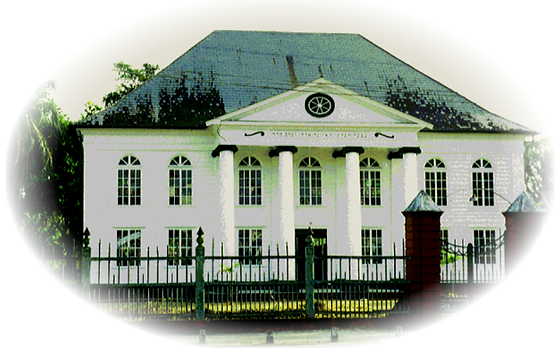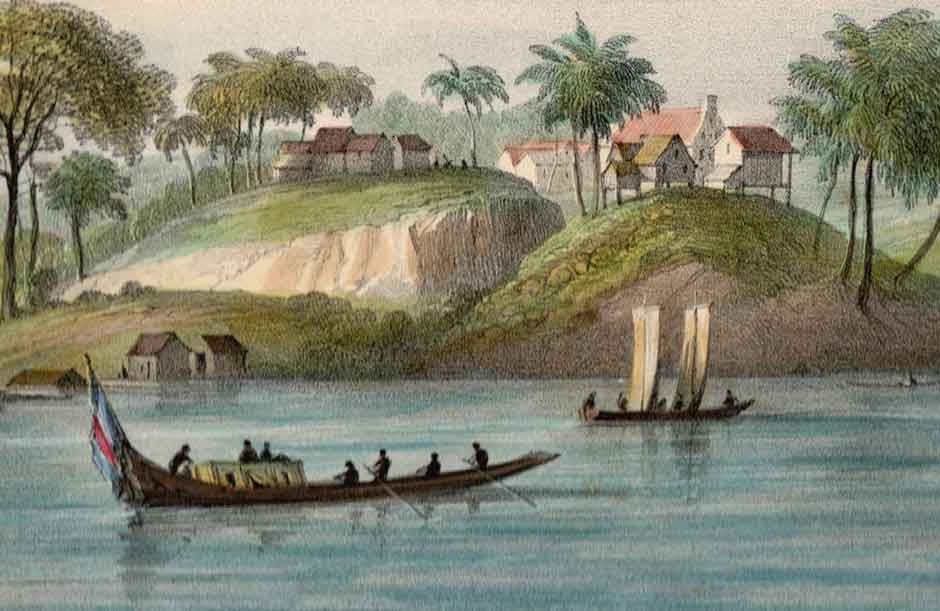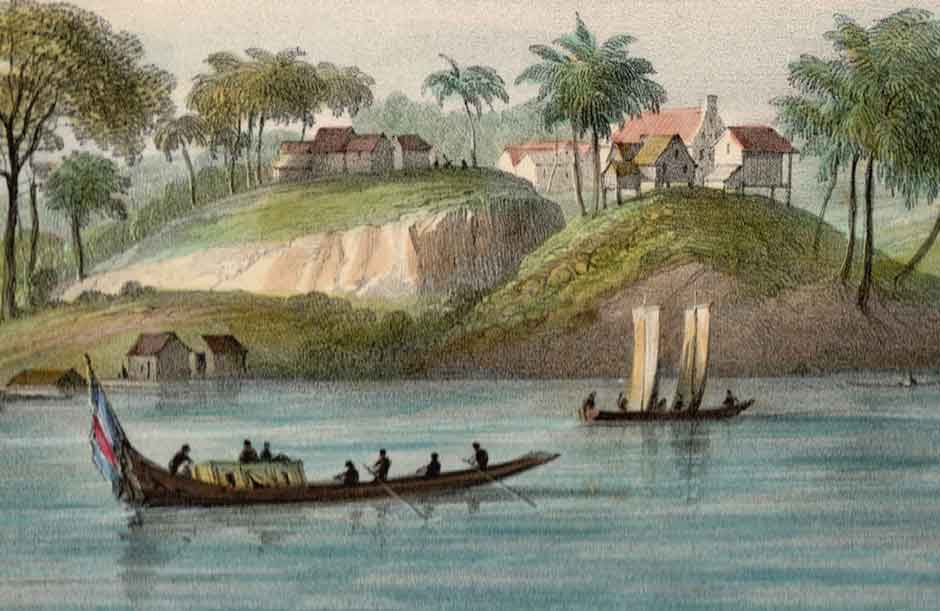Suriname, a small country nestled on the northeastern coast of South America, may not be the first destination that comes to mind when thinking about Jewish communities. However, this hidden gem holds a rich and vibrant history that traces back centuries. Exploring the Jewish Community in Suriname offers a fascinating glimpse into a unique chapter of Jewish history, filled with tales of migration, resilience, and cultural significance. From the early settlers who escaped persecution to the thriving community that exists today, Suriname surprises with its historical depth and cultural mosaic. Whether you are a history enthusiast, a cultural traveler, or simply curious about lesser-known Jewish communities, this article provides an enticing glimpse into the Jewish heritage of Suriname.

History of Jews in Suriname
Suriname, a small country situated on the northeastern coast of South America, has a rich and diverse history. The presence of Jews in Suriname dates back to the 17th century, when the Sephardic Jews arrived from Europe and settled in the region.
Arrival of Sephardic Jews
The Sephardic Jews, primarily of Portuguese and Spanish descent, fled Europe to escape persecution during the Spanish Inquisition. They sought refuge in Suriname, attracted by the relative religious tolerance and economic opportunities offered by the Dutch colonial authorities. Many of them had already established themselves as traders and merchants in other Dutch colonies in the Caribbean and saw Suriname as a promising new frontier.
Development of Jewish Community
Upon their arrival, the Sephardic Jews established a strong and vibrant Jewish community in Suriname. They built synagogues, established religious schools, and formed organizations to support and preserve their religious and cultural traditions. The community grew steadily over the years, with new Jewish families arriving from Europe, the Middle East, and other parts of the Americas.
The Jewish community played an active role in the development of Surinamese society, contributing to various aspects of life in the country. They were involved in trade, commerce, and agriculture, and made significant contributions to the economic growth of Suriname. Additionally, they engaged in public service, politics, and philanthropy, contributing to the overall welfare of the community and the nation.
Influence of Jewish Community on Surinamese Society
The Jewish community has had a lasting impact on Surinamese society. Their values of education, hard work, and strong family ties have been embraced by the wider population. The community’s cultural traditions, including their unique cuisine, music, and festivals, have become an integral part of Surinamese cultural identity. The Jewish community’s commitment to social justice and humanitarian initiatives has also left a lasting mark on the nation, inspiring others to follow suit.
Synagogues and Jewish Facilities in Suriname
The presence of synagogues and other Jewish facilities in Suriname is a testament to the long-standing and vibrant Jewish community in the country. These institutions have played a crucial role in preserving Jewish traditions and providing a space for worship, education, and community gatherings.
Neveh Shalom Synagogue
The Neveh Shalom Synagogue, located in Paramaribo, is the oldest synagogue in Suriname and one of the oldest in the Americas. Built in 1719, it stands as a magnificent architectural marvel, showcasing the cultural and historical significance of the Jewish community.
Beraha Ve Shalom Synagogue
The Beraha Ve Shalom Synagogue, also situated in Paramaribo, is another prominent synagogue in Suriname. Built in 1835, it reflects the changing architectural styles and influences of the time. The synagogue continues to serve as a place of worship and a community hub for Surinamese Jews.
Paramaribo Jewish Cemetery
The Paramaribo Jewish Cemetery, established in the 17th century, is a solemn place that bears witness to generations of Surinamese Jews. It serves as a final resting place for community members and is a symbol of the enduring legacy of the Jewish presence in Suriname.
Jewish Historical Museum
The Jewish Historical Museum in Paramaribo preserves and showcases the rich history and heritage of the Jewish community in Suriname. The museum exhibits artifacts, documents, and photographs that chronicle the journey and achievements of Surinamese Jews. It provides visitors with a deeper understanding of the community’s contributions and struggles, ensuring that their story is not forgotten.
Jewish Festivals and Traditions in Suriname
The Jewish community in Suriname celebrates various festivals and observes age-old traditions that have been passed down through generations.
Passover
Passover, known as Pesach in Hebrew, is a significant festival in the Jewish calendar. It commemorates the liberation of the Jewish people from slavery in ancient Egypt. Surinamese Jews celebrate Passover by conducting special religious services, hosting elaborate family meals called Seders, and refraining from the consumption of leavened products during the eight-day festival.
Hanukkah
Hanukkah, also known as the Festival of Lights, is a joyous celebration that marks the rededication of the Second Temple in Jerusalem. Surinamese Jews celebrate Hanukkah by lighting the menorah, a nine-branched candelabrum, for eight consecutive nights. Each night, a new candle is lit, symbolizing the miracle of the oil that burned for eight days in the ancient temple.
Sukkot
Sukkot is a harvest festival that commemorates the journey of the Jewish people through the desert after their exodus from Egypt. Surinamese Jews build temporary shelters, known as Sukkahs, where they eat their meals and spend time in reflection and celebration. The Sukkahs are decorated with fruits, vegetables, and other natural elements to symbolize the abundance of the harvest season.
Purim
Purim is a festive holiday that commemorates the salvation of the Jewish people from a plot to exterminate them in ancient Persia. Surinamese Jews celebrate Purim by reading the Book of Esther, giving charitable gifts, and engaging in lively festivities. The holiday is marked by dressing up in costumes, exchanging gifts of food, and participating in public celebrations and parades.
Challenges Faced by the Jewish Community
While the Jewish community in Suriname has thrived over the centuries, it has also faced a number of challenges that have shaped its trajectory and identity.
Intermarriage and Assimilation
Like many Jewish communities around the world, Surinamese Jews have faced the challenge of intermarriage and assimilation. As the community interacted more closely with the wider Surinamese society, some individuals chose to marry outside the faith or embrace non-Jewish customs and traditions. This has led to a gradual decline in the population of the Jewish community and a dilution of its distinctiveness.
Declining Population
The Jewish population in Suriname has experienced a significant decline in recent years. Many Jews have chosen to emigrate to larger Jewish communities in the United States and the Netherlands, seeking better opportunities and a stronger Jewish presence. This migration has resulted in a smaller and more dispersed community in Suriname, further affecting the community’s ability to sustain its institutions and traditions.
Preservation of Jewish Heritage
As the younger generations of Surinamese Jews become increasingly detached from their ancestral roots, there is a growing concern about the preservation and transmission of Jewish heritage and traditions. Efforts are being made by community leaders, educators, and cultural organizations to engage young people and ensure that they have a strong understanding and connection to their Jewish identity.

Contributions of Surinamese Jews
Surinamese Jews have made significant contributions to various sectors of Surinamese society, leaving an indelible mark on the country’s history and development.
Business and Commerce
Surinamese Jews have a long history of involvement in business and commerce. From the earliest days of the Jewish presence in Suriname, Jewish merchants and traders played a vital role in the development of the economy. They established successful businesses, created employment opportunities, and facilitated trade between Suriname and other parts of the world.
Public Service and Politics
Surinamese Jews have also been active participants in public service and politics. Many Jewish individuals have held positions of leadership and served in government roles, contributing their skills, knowledge, and perspectives to the governance of the country. Their commitment to public service and the welfare of the nation has been a hallmark of the Jewish community in Suriname.
Cultural and Artistic Endeavors
The Surinamese Jewish community has made noteworthy contributions to the country’s cultural and artistic landscape. From literature to music, visual arts to theater, Surinamese Jews have left an indelible mark on the creative industries. Their unique cultural heritage has inspired countless artistic creations, enriching the Surinamese cultural tapestry.
Relations with Other Ethnic and Religious Groups
Surinamese Jews have cultivated relationships with various ethnic and religious communities throughout the history of their presence in the country.
Hindu and Muslim Communities
Suriname is home to a diverse population that includes Hindus and Muslims, among other groups. Jews have maintained amicable relationships with these communities, recognizing the shared experiences of migration, religious observances, and cultural traditions. Interfaith dialogue and cooperation have played a significant role in promoting harmony and understanding between different faith communities in Suriname.
Indigenous Peoples
The Jewish community has also interacted with Suriname’s indigenous population, forging connections and fostering mutual respect. Through cultural exchanges, educational initiatives, and collaborative projects, Surinamese Jews have worked towards building bridges with the indigenous peoples, acknowledging their rich heritage and contributions to the nation.
Dutch Colonial Authorities
During the period of Dutch colonial rule in Suriname, the Jewish community interacted closely with the colonial authorities. The Dutch authorities offered the Jews relative religious freedom and autonomy, enabling them to practice their faith and engage in economic activities. In turn, the Jewish community contributed to the economic development of the colony, forming a mutually beneficial relationship with the Dutch authorities.

The Jewish Experience during WWII
The Holocaust had a profound impact on the Jewish community in Suriname, despite its geographic separation from Europe.
Refugees from Europe
During World War II, Suriname became a haven for Jewish refugees fleeing Nazi-occupied Europe. The country’s relative safety and the presence of an established Jewish community made it an attractive destination for those seeking refuge. Many European Jews found solace in Suriname and were welcomed into the existing Jewish community, further enriching its diversity.
Internment and Deportation
Although Suriname offered safety to many Jewish refugees, there were also instances of internment and deportation. The Dutch colonial authorities, who were in control of Suriname during the war, established internment camps on the outskirts of Paramaribo to hold suspected German sympathizers. Some Jews were unjustly interned alongside others, enduring difficult conditions before being released or transferred to other locations.
Resistance and Survival
Despite the challenges and dangers they faced during World War II, Surinamese Jews displayed remarkable resilience and bravery. Some individuals joined the resistance movement in Europe, fighting against the Nazi regime and aiding the liberation effort. Others played crucial roles in supporting the Jewish community and preserving its heritage, ensuring that the legacy of Surinamese Jews would endure.
Post-WWII Developments and Migration
The aftermath of World War II brought significant changes and opportunities for the Jewish community in Suriname.
Establishment of the State of Israel
The establishment of the State of Israel in 1948 had a profound impact on Jewish communities worldwide, including Suriname. The newfound sense of nationhood and the desire to support the newly formed Jewish state led many Surinamese Jews to consider migrating to Israel. This marked a significant turning point in the demographics and dynamics of the Surinamese Jewish community.
Migration to the United States and Netherlands
In addition to migration to Israel, Surinamese Jews also sought new opportunities in other countries, particularly the United States and the Netherlands. These destinations offered economic prospects, educational opportunities, and larger Jewish communities. This wave of migration contributed to a further decline in the Surinamese Jewish population and reshaped the community both in Suriname and abroad.

Revitalization Efforts and Contemporary Jewish Life
Despite the challenges and changes faced by the Surinamese Jewish community, efforts are underway to revitalize and strengthen Jewish life in Suriname.
Jewish Education
Recognizing the importance of preserving Jewish heritage and traditions, the community has invested in Jewish education. Schools and educational programs have been established to ensure that young people have access to quality Jewish education and can develop a strong Jewish identity. These initiatives play a crucial role in passing on the customs, rituals, and values of the community to future generations.
Youth Engagement
Engaging the younger generation is vital to the continuity and vibrancy of the Surinamese Jewish community. Youth organizations, camps, and activities have been established to build bridges between young people and their Jewish heritage. These initiatives provide spaces for young Surinamese Jews to connect, learn, and celebrate their shared identity.
Community Organizations
Community organizations play a pivotal role in fostering a sense of unity and providing support to Surinamese Jews. They organize social, cultural, and educational events, helping to strengthen the fabric of the community. These organizations serve as platforms for networking, advocacy, and the preservation of Jewish traditions and values.
Conclusion
The history of Jews in Suriname is a testament to the resilience, contributions, and challenges faced by the Jewish community. From their arrival during the 17th century to the present day, Surinamese Jews have left an indelible mark on the country’s history, culture, and development. Despite the decline in population and the pressures of assimilation, efforts to preserve Jewish heritage and revitalize Jewish life continue to shape the future of the Surinamese Jewish community. With a rich history, vibrant traditions, and ongoing engagement, Surinamese Jews serve as an integral part of the diverse tapestry of Surinamese society.

